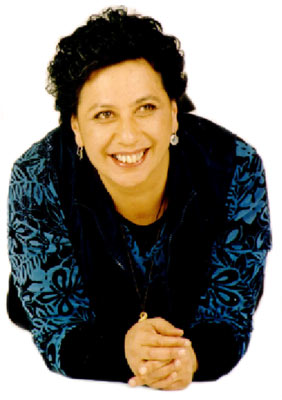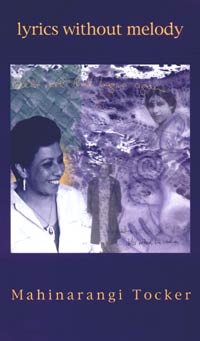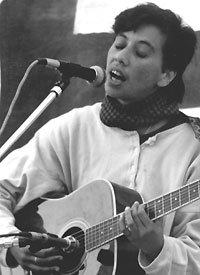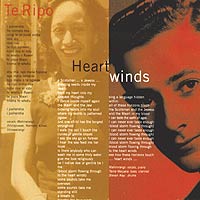BAFA © 2010. All material here is copyrighted. See conditions above. |
Mahinarangi Tocker,
singer, songwriter, poet, Aotearoa / New Zealand.
|
 In 2001 The Christchurch Arts Centre invited me to be artist in residence for two months. It was a beautiful time and
musically inspiring for me. The people and students at a local college with whom I was privileged to work were encouraging and supportive of me. To have 2 months in a lovely rent free apartment which overlooked the Christchurch Botanical Gardens with it's peculiar water fountain of strange sculptures and colours, was a marvellous view to eat breakfast by, and think about sounds.
I wrote about 22 songs and 3 percussion pieces. I had a choice of two grand pianos to use whenever I wanted, a rehearsal room (which I didn't use at all), and the freedom to make as much noise in my appartment as I wanted.
So, I wrote percussion pieces on chairs, my guitar cases, numerous empty bottles of wine, sand paper and knuckle bones, the kitchen floor and odds and ends that I found around the Arts Centre. Most of my compositions were written using guitar and/or piano. I wrote also for Northumbrian pipes and voice. And very much enjoyed working with students at a local high school on a piece I wrote using
the body as percussion and voice in choral accapella.
This percussion piece with lyrics in Maaori was called 'Te Hau' (Breath or Wind). I wrote the material incorporating some ideas from a composer friend of mine with whom I worked on a film last year, David Downes. We are both credited for Te Hau.
I wrote music to be sung and/or played by some of my favourite Christchurch songsters and musicians who performed their given works at a concert performed at the Arts Centre's Great Hall. These marvellous people gave a lot of fine energy and new positive breath to the works.
Denny Stanway, vocalist, James Wilkinson, singer/songwriter in his own right and a guitarist for whom I have great respect, Jimmy Young, pipes, and students of Aranui High School who sang a 'waiata' (song in Maaori) which also incorporated the body as a percussion instrument. The concert was called 'Whanaungatanga', which is a concept of family and extended family. The songs were those of love, life and family.
The song 'Kei Hea Koe' was first released as a single to all Maaori orientated radio stations with help from Te Mangai Paho, a Maaori specific funding organisation for the Creative Arts. The song was then recorded to a compilation album of Maaori women songwriters. The album is called 'He Karanga' (see: www.maorimusic.com).
'He Karanga' refers to the 'call' of the women on the Marae without whom there would be no persons allowed to walk the sacred earth to any of the buildings there. For it is the woman's voice which makes the way clear and safe for visitors to enter these grounds. The Marae is where we Maaori have our ancestral rights. For many of us, it is our 'standing place'.
Kei Hea Koe? (means Where Are You?) is a song about love lost and love searched. It talks of the emotions of holding fast to a 'forever love'. It was produced in Wellington by Charlotte Yates (www.charlotteyates.com) another New Zealand singer/songwriter. She is not of Maaori descent but has good heart, knowledge and respect. The song was written for guitar and percussion. I tuned all the strings to 'E' which I've since discovered, for live concerts, is a pain because I can't afford the time on stage to change tuning to this particular tuning. So, I've had to learn a new way of playing the song on guitar which will not be a hindrance in the future. It was fun to write and record but foolish for me in terms of live playing.
On the recording I played acoustic guitar, acoustic drum, and an assortment of 'shakers', and Charlotte Yates played second guitar.
|
In 2001 "Lyrics without Melody" a book of 36 poems was published by Street Women Press (www.streetwomen.co.nz)
and since then some of the poems have become songs.
speaking in parent turn
'haere mai kootiro' (translation: Come here girl)
in her skin aging wisdom
she calls
easy to speak of love now
now that she listens
now that i talk
now that she laughs
now that i can hear
my mother converses
time encountered
time in tears
time in love
i speak
she listens
engaged in dancing words
of song sung adventure
struggling parent war
of kid desires
peace
and resistance
we make our own space
we make our own space
she holds my hand
she rubs my shoulder
she kisses my cheek
i am sorry
for my childhood perceptions
she is sad
at our memories
i sing her lesbian stories
she finds a new melody
for me to respect
i hold her closer
to my heart
she tells me
i am stronger than i know
'ka aroha' (translation:sorry)
she whispers when there are tears
'hei aha' (translation:never mind)
she giggles when we are too full
in truth with my father
i am in truth with myself
his weakening heart
beats to stronger
love
and
my mind is musical
to his kindness
and laughter
sharing visions of hebrew
thought
in language of humilty
and trials
where he and i are commonly
bonded
|

Reviewer NIck Bollinger wrote of this collection, "If you've heard Tocker sing on disc or stage, you'll know what a playful, skilful vocalist she is. Her rhythmic sense is elastic. She plays her voice like an improvising instrumentalist, teasing it, pushing it, expanding and contracting it. And though she's left these words to fend for themselves on the page, she's imbued them with much of her rhythmic bravery:
"a breath is a breath
is a sound is a sigh
is a knot in my belly
that I'll never define..."
Like her singing, there's a freeness to her writing that defies the song form.You won't find many choruses among these paper songs, but you'll find rhythmic grooves and recurring motifs.
"Truth" is a word Tocker writes often. And through these sometimes tangled, often riddle-like lines she seems to be teasing out the truth: in relationships, in love, in intimacy, and imagination."
(JAAM December 2001)

Mahinarangi performing at Whare Flat folkfestival, 1988.
|
The album, 'Touring' by Charlotte Yates and myself, was released in September 2002. We chose songs that people often request when we do work together. It's an interesting collection I think. All acoustic and a nice mix of folk like, funk like, and rock like. A little percussion, a lot of guitar, and a wide range of vocal ideas. Some of the songs have previously been recorded on our various past albums, and some are brand new. I loved doing this album with Charlotte. We produced it ourselves and had our engineer, Andrew Downes (brother of David)to record it for us at Marmalade Studios in Wellington last year. It will be distributed by Jayrem Records who are also associated with www.maorimusic.com.
|

Arts Dialogue, Dintel 20, NL 7333 MC, Apeldoorn, The Netherlands
email: bafa@bahai-library.com
|
|



